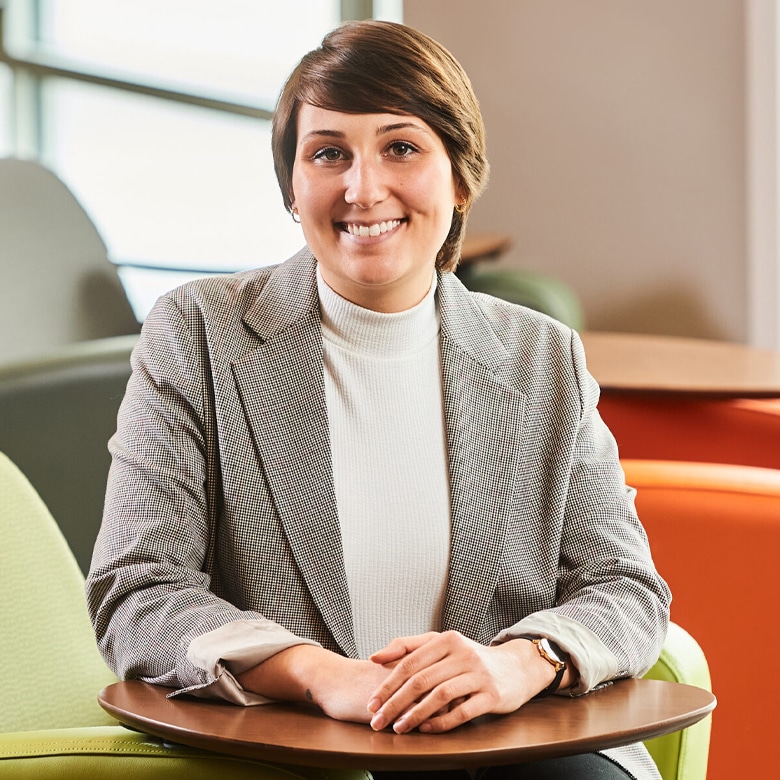Why did you decide to have a career in philanthropy?
I grew up in poverty in rural northern Wisconsin. I was lucky to have the opportunity to attend college, where I learned to describe the cycle of poverty that my community and I experienced. Once I understood that my experiences were deeply systemic and not personal failings, I decided to dedicate my life to creating change for future generations.
Philanthropy and charity can be one of the most productive ways to bring about change because of the enormous capital available. At the same time, one of philanthropy’s unfortunate legacies is the idea of the “deserving poor.” Philanthropy tends to direct funds to the organizations—and therefore the people—who seemingly “deserve” it the most, not simply to those who need it. In ancient Greek, Philanthropy quite literally means “love of humanity.” If we are to live up to our name, philanthropy must shift focus to helping all people who are struggling, whether it be for food, money, housing, or more, and not just people who are tested against pre-determined criteria. I chose to work in philanthropy because I want to help our clients and the industry shift our understanding of how we can help humankind.
What does your role at Geneva Global involve?
When I explain philanthropy advising to my dad, I explain it as “helping clients give away money well.” What that means in practice for me day-to-day is many different things. I provide Salesforce System Administrator services to one of our foundation clients, including data maintenance and developing workflows for inbound and outbound funds. For another budding non-profit client, I support the development of their organizational policies and operational plan. I also serve in a Grants Manager capacity for one of the funds hosted at our parent company, Global Impact, helping to run the application process and support grantees through their grant term.
In each of these seemingly distinct parts of work, my approach is the same in thinking about how I can help our clients deliver the most impact to the communities they serve.
What fulfills you most about your role?
I feel fulfilled when I get to solve problems with my team. Our clients come to us at various stages in their organizational and/or philanthropic journeys, each with their own set of values, priorities, and roadblocks. The way I think about a situation is rarely the same as my colleagues—which is what makes Geneva Global great at what we do—but it is also satisfying to watch someone arrive at a completely different, equally exciting conclusion from the same set of facts.
Oh, and the quality and quantity of GIFs in our online Teams chats are also very fulfilling.
How has the philanthropy landscape changed over the last few years?
More and more, I see people giving where their heart is. Between the pandemic, the murder of George Floyd, and an increasing climate crisis, people (major philanthropists and my social circle, alike) are giving to organizations who are on the front lines aiding in crises responses. People contribute to the human services sector because they want to contribute to something impactful and meaningful as quickly as possible. I hope we continue to see this pattern of people responding to crises with philanthropy.
What advice would you give to someone who wants to work in philanthropy (or philanthropy consulting)?
Don’t be afraid to reach out to someone in the industry and have a conversation. Philanthropy is a niche industry, and in my experience, people who work in philanthropy are kind, passionate, and excited to talk about their work.
What are you most excited about for the future of philanthropy?
I’m excited about no-minimum donor-advised funds. Fidelity Charitable recently removed the $5,000 minimum contribution to open a DAF. While the verdict isn’t in on whether this will mobilize more dollars to charities, I’m excited about the idea of everyday givers being able to participate in what has become one of the easiest, most popular giving vehicles. Offering more ways to participate in philanthropy will only help the industry and donors evolve.
What are you reading right now?
My younger, perhaps more-disciplined self would’ve been bummed to learn that I’ve grown into a person who can’t finish a book before she starts a new one. Currently, I’m reading Decolonizing Wealth by Edgar Villanueva, Arbitrary Lines: How Zoning Broke the American City and How to Fix It by M. Nolan Gray, and The Devil in the White City by Erik Larson.
Where do you get your news?
I get my news from NPR, The Daily podcast by the New York Times, and checking what’s trending on Twitter every now and then.
For more information about Megan and to meet the rest of our team, please click here.

